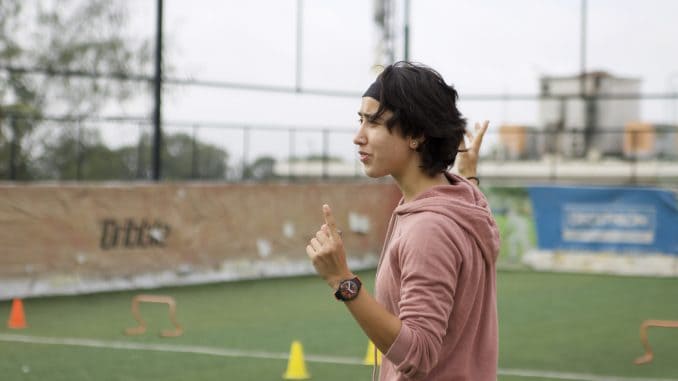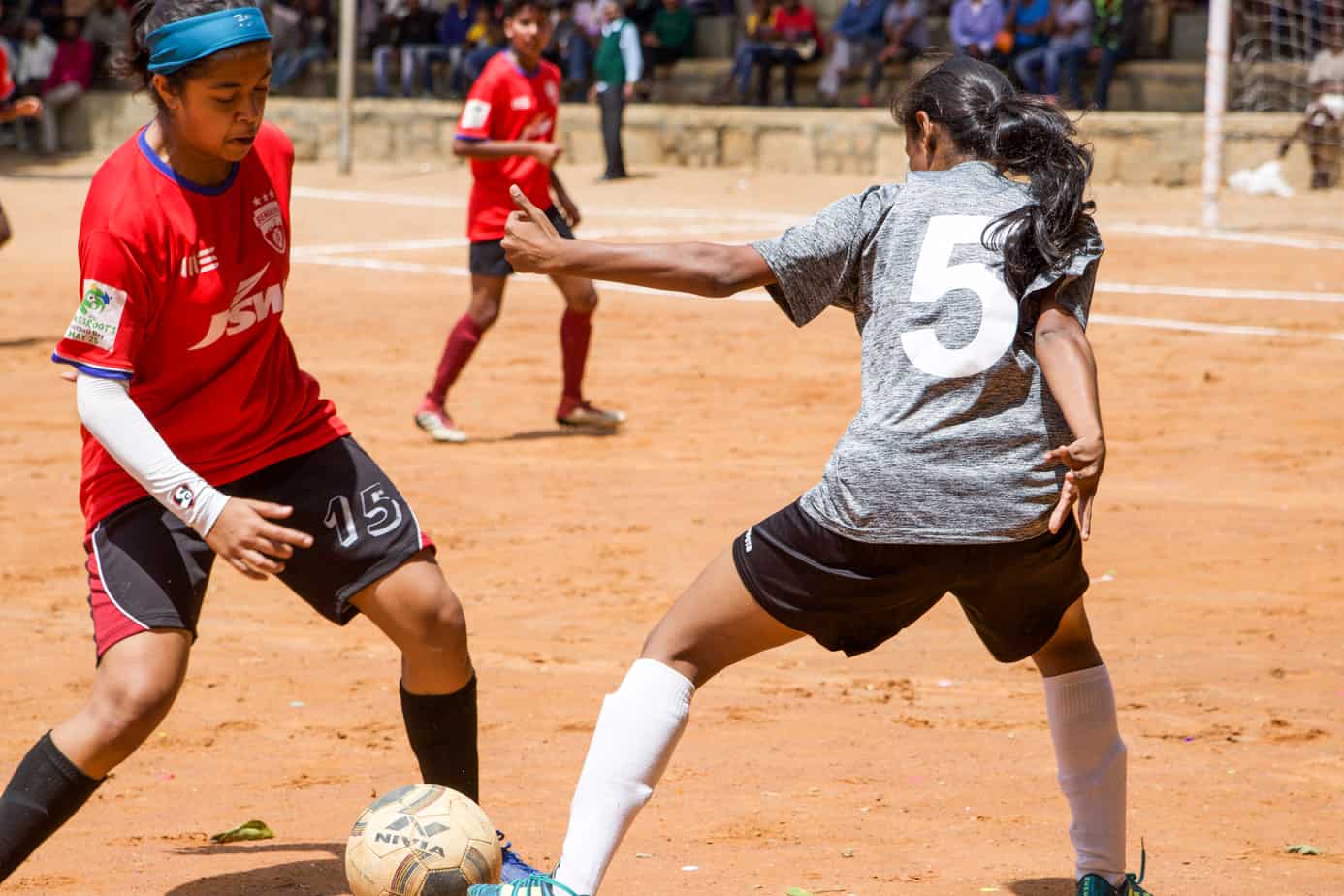The Karnataka state women’s team is battling it out in the ongoing National Women’s Football Championship in Arunachal Pradesh. For the talented team and their captain Tanvie Hans, it’s a constant struggle for opportunities, yet they give the game their best. In the concluding part of this series on women’s football, we look at the professional women players.
It’s Wednesday, which means that Brishti Bagchi, 25, only has three practices today. In less than two weeks, she will be on a plane headed to Madrid to play professional football, a dream she has had since she was a little girl.
“I’m nervous but damn excited,” Brishti says.
Brishti started playing football when she was seven-years-old, and hasn’t stopped since. She left her family at the age of 17 to attend Oklahoma State University in the US and play football as a walk-on (that is, joining a team without tryouts or committing formally). It was in Houston, Texas, though that she was spotted by a Spanish scout at a trial for the National Women’s Soccer League team – the professional football league in the US in which international stars like Alex Morgan and Megan Rapinoe play.
While Bagchi is leaving India to play in Europe, Tanvie Hans, 26, has done the opposite. After attending university in England, Tanvie played for the women’s side of Tottenham and Fulham clubs in the FA Women’s Premier League. This league is just a tier below the Women’s Super League, England’s highest league for women. But in 2016, she returned, to play in India. A curious decision considering the state of women’s football here.
“I was always going to come back to India,” she says.
Tanvie grew up in Delhi, which is where she developed as a footballer. As a teenager, she played for the Delhi state team for years and went through the system. But when she was called for a U-19 national camp, she found out that her British citizenship prevented her from ever being able to play for her country, which was her ultimate goal. Tanvie’s parents had decided to give her British citizenship at birth, since her mother had British citizenship.
“Every single time I sing the national anthem I have tears in my eyes,” Tanvie says. “I’m just connected to this country, I don’t have that sort of emotion for any other country or any other flag, regardless of my citizenship.”
It was one of the reasons she decided to enrol in a university in England, and play – she figured she might as well take advantage of her British citizenship. “The idea was always to grow as a player, but I knew what a privileged position I was in. And I did not want to use it in a selfish way,” she says.
After playing in England for three years, Tanvie came back to India in 2016. By then, the All India Football Federation (AIFF) was starting the Indian Women’s League (IWL), a counterpart to the Indian Super League (ISL). But Tanvie’s British citizenship prevented her from playing in the inaugural season of the IWL too, as she was considered a foreign player.
Though the second season saw Tanvie with Sethu FC, a team from Tamil Nadu, she left the team because of limited playing time. Eventually, she landed with Parikrma which would play in the first iteration of the Karnataka’s Super Division League. The Karnataka State Football Association (KSFA) had formed the Super Division League – its first league for women – earlier this year; five teams including Parikrma had played in the league. The winning team from the state leagues go on to play in the IWL.
Bangalore United FC won the Super Division League this year, and was selected to play the IWL season. But the club took in Tanvie on loan, to play for them at IWL.
Now Tanvie is captaining the Karnataka state team at the ongoing Women’s National Football Championship at Arunachal Pradesh.
“My impact on field has been quite limited, but if I can make a difference in any other way, I try to,” Tanvie says. Every Sunday she runs a session for Sisters in Sweat, a group of women aged between 25 and 40 who are rediscovering the game or finding it for the first time. She also actively works with KSFA to grow the women’s game.

Tanvie Hans runs football sessions for Sister in Sweat, with fitness trainer Swetha Subbia every Sunday. Pic: ‘DD’ Grace Madigan
One of Hans’s teammates on Parikrma was Raksha Panwar who cites Hans as an inspiration for women and girls everywhere. Raksha comes from a football family. Her father was a footballer in Calcutta and her brother Sahil Panwar plays for FC Pune.
“If I touch the ball, there is an energy that I feel; it goes from my leg to my brain and I forget everything,” Raksha says.
When she was younger, Raksha remembers being so obsessed with the game that she would sleep with the ball. She represented India in the U-13, U-14, U-16, and U-19 national teams, but an injury from playing in college has held her back from playing for the national women’s team.
Now she’s continuing rehab to get back to playing at 100 percent. But in the meantime, besides playing for Parikrma, Raksha works as a sports conditioning coach for Cure.fit. She has also got her ‘C’ license for coaching football; ‘C’ license is the second of five levels of coaching licenses that AIFF offers.
While Tanvie and Raksha are in the middle of their football careers, 17-year-old Ritika Srivatsan is just at the beginning of hers. Like the aforementioned women, Ritika has the support of her parents and a love of football driving her to pursue it as a career.
“I decided to get homeschooled, and moved to France for a year and trained with a club there,” Ritika explains.
She took part in KSFA’s Super Division league playing for the Indian Football Factory, and plans to go abroad again to finish high school and to also play football for the school’s team. Depending on her visa, she may stay overseas for undergraduate studies. But like Hans, she plans to eventually come back.
“I definitely want to play for the national team. Also, the IWL is planning to expand to 24 teams. I want to play for the state here again and to see football grow in India,” Ritika says.
Challenges abound
All these women can attest to the challenges that come with trying to make a profession out of something that is seen by many as a man’s game, or just that – a game. Female footballers around the world are not unfamiliar with the sacrifices they have to make, to play the game they love.
News18 recently reported that the IWL team Panjim Footballers hasn’t paid their players for two seasons. Panjim Footballers denied that they ever promised match fee payments to the players, as per the report.
The few clubs that do pay their players at the IWL vary greatly in what they pay. Sought-after national team players may earn a higher contract than others. Tanvie believes that only two teams out of 12 in the IWL were properly paid in the past season.
“If the rest paid their players, it was a very nominal amount which would probably last them only a week or two,” Hans said, noting that the IWL season itself lasts only a couple of weeks. “Most of the teams went in pro-bono is what I heard, and that’s just how it is.”
In contrast, male footballers’ pay in the ISL ranges anywhere between Rs 20 lakh and over Rs 1 crore per season.
As for Karnataka’s Super Division League for women, none of the teams paid their players, except for covering their expenditures. “There was no discussion like that because it’s very rare to get the opportunity in India to actually play,” Raksha says. “We used to wait the whole year just to play state-level nationals.”
While opportunities to play matches – 11-a-side and otherwise – have increased, there still isn’t a structure in place that allows women footballers to play the majority of the year.
“Playing in India is very periodic in the sense that it’s only one, two or three months you’ll be engaged in the sport, then nothing will happen. And then again you’ll be engaged for two-three months. There’s no stability there,” Tanvie said.
Not only are the seasons short – the IWL lasting only 2-3 weeks, and Super Division lasting only a month – so are the preparations by the state and national teams for tournaments.
“We don’t even practice at least a few months prior to the tournament,” Ritika says. “It’s all last minute. It’s 10 days before the tournament that we practice, and then they make a team.”
Ultimately what people – investors, officials, and fans – want, is to see their team win. The failure of India’s national women’s and men’s football teams to succeed at the international level has been a huge hurdle for them to get funding and support. It’s a bit of a catch-22.
“You need to show the end product to get support rather than get support to achieve the end product—that’s how it works here,” Tanvie says.
What the future holds
On September 5th, the Karnataka state women’s team left for Arunachal Pradesh to play in the 25th Women’s National Football Championship. KSFA had announced the final roster of 20 girls just the previous Saturday. The team is extremely young, with Tanvie being the oldest at 26.
“Our aim is not necessarily to win this tournament, but to build on this team for a stronger future,” Tanvie said over a message to the Sisters in Sweat Whatsapp group, encouraging them to watch the state team’s last practice before they left.
Tanya Gupta from Young Stars FC, and Rafiya Fathima from Shining Stars FC, who were opponents in the Independence Day Cup tournament this August, are now teammates representing Karnataka. Both girls are only 15-years-old, representing a new generation of footballers from the state.

This year, Bengaluru’s 63-year Independence Day Cup opened to women for the first time. Pic: ‘DD’ Grace Madigan
We don’t know how next year’s women’s U-17 World Cup to be hosted by India will play out, and whether women playing at such a huge platform will draw enough support to finance the game’s growth.
We don’t know whether the girls that Leanne Cockburn coaches every week will continue to play football, whether the girls from Dream a Dream will pursue professional football careers, or what will become of the football careers of Tanvie Hans and Raksha Panwar.
We don’t know if the daughters of the women who play football every week with Sisters in Sweat will one day lace up their own boots and take the pitch, if Rikita Srivatsan will ever get to represent her country on the national team, or how many girls will be told to stop playing football and how many will continue to keep playing anyway.
What we do know is that Brishti Bagchi is the first Indian woman to play in La Liga. Ritika Srivatsan and Young Stars FC became the first female champions to hoist the Independence Day Cup in its 63-year history. KSFA organised the first women’s league this year and are planning another (A division) for next season.
Only time will tell if Indian women’s football will one day start bringing home trophies and medals. But what we do know right now, is that the love and passion that we’ve seen from young girls and women for the game is unwavering, and that will never change.